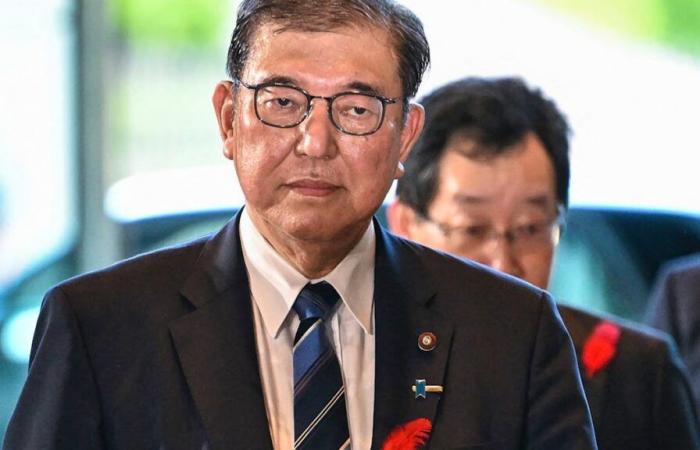On Monday, Shigeru Ishiba was reappointed to his post by the elected representatives of the lower house of Parliament with 221 votes, against 160 for his rival Yoshihiko Noda, leader of the main opposition party.
AFP
Japanese Prime Minister Shigeru Ishiba was re-elected on Monday following a parliamentary vote, but will have to be content with a fragile hold on power after recent legislative elections, which were disastrous for his party. Internationally, Donald Trump’s victory in the United States could also complicate the task of the former Minister of Defense. Washington could very quickly impose new customs duties and demand from Tokyo an increase in its military spending deemed insufficient by Trump.
Ishiba took office in early October, after being elected head of the ruling Liberal Democratic Party (PLD), and quickly called early elections which, he hoped, would consolidate his mandate as leader of the party. government.
Instead, voters, dissatisfied with recurring inflation for more than two years and vexed for several months by a “slush fund” scandal which had contributed to the collapse of his predecessor Fumio Kishida, inflicted on the PLD its worst result since 2009.
A Parliament without a clear majority
As a result, the archipelago could find itself in a political impasse with a Parliament without a clear majority. On the one hand, the conservative PLD and its ally, the center-right Komeito, have lost an absolute majority but nevertheless remain the largest bloc in the powerful lower house of Parliament. On the other hand, opposition parties are deeply divided on many key issues and unable to oust Ishiba, but nevertheless remain essential to pass laws.
On Monday, Ishiba was reappointed to his post by the elected representatives of the lower house of Parliament with 221 votes, against 160 for his rival Yoshihiko Noda, leader of the main opposition party, the Constitutional Democratic Party (PDC). A second round of voting had to be organized, in the absence of a majority, to decide between the two candidates who came first in the first round, a first since 1994.
The ruling bloc will now have to deal with other blocs to hope to have its program adopted and has requested help from the People’s Democratic Party (PDP), a small centrist group which has agreed to cooperate piecemeal, rather than join the coalition.
The threat of inflation
In its negotiations with the LDP, the DPP has already demanded tax cuts and energy subsidies that economists say would significantly reduce the government’s tax revenue. Alongside these delicate negotiations, Ishiba is also facing discontent within his party, which lost dozens of seats – including those held by ministers – in the October 27 elections.
“If he doesn’t improve his popular support, LDP members might start saying they can’t go into the Upper House election battle with Ishiba” and look for another leader, the newspaper said. ‘AFP Tomoaki Iwai, professor at Nihon University, in reference to the senatorial elections which will take place next July. The Ishiba government’s approval rating is just above 30%, but polls show a majority of the public believes he should remain prime minister.
Ishiba faces a bumpy road ahead, as both Americans and Japanese lawmakers are likely to push him to increase public spending and at the same time cut taxes, analysts say. Possible new US customs duties on Chinese and Japanese products could fuel inflation.
(afp/er)






